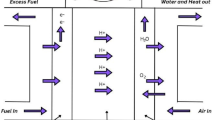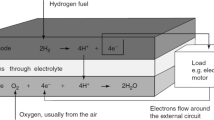Abstract
In recent years, proton exchange membrane fuel cells (PEMFCs) have been known to be a viable method for meeting the electrical energy needs, thereby enhancing the overall reliability of renewable energy systems. PEMFCs demonstrate various promising attributes like pollution-free, totally sustainable, non-self-discharging. These need hydrogen as fuel, and air for their operation, while the final product is pure water only. Thus, under varying operating conditions, the appropriate modeling and parameter optimization of PEMFCs have gained considerable importance in recent times. The evolutionary optimization approaches had been utilized in recent past for estimating PEMFCs parameters as exact modeling of the same does not exist in the literature. For the evaluation of PEMFCs performance criteria, a newly proposed algorithm is developed in this manuscript i.e. black widow optimization (BWO). Firstly, the performance of this proposed algorithm is checked by complex benchmark results. After that, this proposed algorithm is applied to extract the parameters of PEMFCs models under different operating temperatures. The parameter optimization results are obtained using BWO and are further compared with those obtained with five other algorithms, i.e., particle swarm optimization (PSO), multi-verse optimizer (MVO), sine cosine algorithm (SCA), whale optimization algorithm (WOA), and grey wolf optimization (GWO). The complete error analysis is carried out for the two data sheets of the PEMFCs to establish the superiority of BWO. It has been observed that the developed proposed algorithm gives better results when compared to those obtained with rest of the algorithms considered in this work. After calculating the error, non-parametric test is performed which suggests that the BWO is better than the rest of the compared algorithms.












Similar content being viewed by others
References
Al-Baghdadi MAS (2005) Modelling of proton exchange membrane fuel cell performance based on semi-empirical equations. Renew Energy 30(10):1587–1599
Ali EE, El-Hameed MA, El-Fergany AA, El-Arini MM (2016) Parameter extraction of photovoltaic generating units using multi-verse optimizer. Sustain Energy Technol Assess 17:68–76
Ali M, El-Hameed MA, Farahat MA (2017) Effective parameters identification for polymer electrolyte membrane fuel cell models using grey wolf optimizer. Renew Energy 111:455–462
Amphlett JC, Baumert RM, Mann RF, Peppley BA, Roberge PR, Harris TJ (1995) Performance modeling of the Ballard Mark IV solid polymer electrolyte fuel cell I. Mechanistic model development. J Electrochem Soc 142(1):1–8
Andrade MC (2003) Risky mate search and male self-sacrifice in redback spiders. Behav Ecol 14(4):531–538
Askarzadeh A, Rezazadeh A (2011a) Optimization of PEMFC model parameters with a modified particle swarm optimization. Int J Energy Res 35(14):1258–1265
Askarzadeh A, Rezazadeh A (2011b) Artificial immune system-based parameter extraction of proton exchange membrane fuel cell. Int J Electr Power Energy Syst 33(4):933–938
Askarzadeh A, Rezazadeh A (2011c) An innovative global harmony search algorithm for parameter identification of a PEM fuel cell model. IEEE Trans Ind Electron 59(9):3473–3480
Askarzadeh A, Rezazadeh A (2011d) A grouping-based global harmony search algorithm for modeling of proton exchange membrane fuel cell. Int J Hydrog Energy 36(8):5047–5053
Avelar, H. J., Coelho, E. A. A., Camacho, J. R., Júnior, J. V., Freitas, L. C., & Wu, M. (2009, October). PEM fuel cell dynamic model for electronic circuit simulator. In 2009 IEEE Electrical Power & Energy Conference (EPEC) (pp. 1-6). IEEE.
Barbir F (2012) PEM fuel cells: theory and practice. Academic press
Chen H, Jiao S, Heidari AA, Wang M, Chen X, Zhao X (2019) An opposition-based sine cosine approach with local search for parameter estimation of photovoltaic models. Energy Convers Manag 195:927–942
Forster LM (1995) The behavioural ecology of Latrodectus hasselti (Thorell), the Australian redback spider (Araneae: Theridiidae): a review. Rec West Austral Museum 52:13–24
Garb JE, González A, Gillespie RG (2004) The black widow spider genus Latrodectus (Araneae: Theridiidae): phylogeny, biogeography, and invasion history. Mol Phylogenet Evol 31(3):1127–1142
Gong W, Cai Z (2013) Accelerating parameter identification of proton exchange membrane fuel cell model with ranking-based differential evolution. Energy 59:356–364
Gong W, Cai Z (2014) Parameter optimization of PEMFC model with improved multi-strategy adaptive differential evolution. Eng Appl Artif Intell 27:28–40
Gong W, Yan X, Liu X, Cai Z (2015) Parameter extraction of different fuel cell models with transferred adaptive differential evolution. Energy 86:139–151
Hayyolalam V, Kazem AAP (2020) Black widow optimization algorithm: a novel meta-heuristic approach for solving engineering optimization problems. Eng Appl Artif Intell 87:103249
Li Q, Chen W, Wang Y, Liu S, Jia J (2010) Parameter identification for PEM fuel-cell mechanism model based on effective informed adaptive particle swarm optimization. IEEE Trans Ind Electron 58(6):2410–2419
Mohamed I, Jenkins N (2004) Proton exchange membrane (PEM) fuel cell stack configuration using genetic algorithms. J Power Sources 131(1-2):142–146
Mohammadi A, Cirrincione G, Djerdir A, Khaburi D (2018) A novel approach for modeling the internal behavior of a PEMFC by using electrical circuits. Int J Hydrog Energy 43(25):11539–11549
Mo ZJ, Zhu XJ, Wei LY, Cao GY (2006) Parameter optimization for a PEMFC model with a hybrid genetic algorithm. Int J Energy Res 30(8):585–597
Mosaad MI, Ramadan HS (2018) Power quality enhancement of grid-connected fuel cell using evolutionary computing techniques. Int J Hydrog Energy 43(25):11568–11582
Ohenoja M, Leiviskä K (2010) Validation of genetic algorithm results in a fuel cell model. Int J Hydrog Energy 35(22):12618–12625
Oliva D, Abd El Aziz M, Hassanien AE (2017) Parameter estimation of photovoltaic cells using an improved chaotic whale optimization algorithm. Appl Energy 200:141–154
Saad NH, El-Sattar AA, Mansour AM (2013) Adaptive neural controller for maximum power point tracking of ten parameter fuel cell model. J Electr Eng 13(3):233–239
Sedighizadeh M, Kashani MF (2014) A tribe particle swarm optimization for parameter identification of proton exchange membrane fuel cell. Int J Eng Trans A Basics 28(1):16–24
Singla MK, Oberoi AS, Nijhawan P (2019) Trends so far in hydrogen fuel cell technology: state of the art. Int J Adv Comp Sci Eng 8(4):1146–1155
Thankachan T, Prakash KS, Pleass CD, Rammasamy D, Prabakaran B, Jothi S (2017) Artificial neural network to predict the degraded mechanical properties of metallic materials due to the presence of hydrogen. Int J Hydrog Energy 42(47):28612–28621
Turgut OE, Coban MT (2016) Optimal proton exchange membrane fuel cell modelling based on hybrid teaching learning based optimization–differential evolution algorithm. Ain Shams Eng J 7(1):347–360
Yang S, Chellali R, Lu X, Li L, Bo C (2016) Modeling and optimization for proton exchange membrane fuel cell stack using aging and challenging P systems based optimization algorithm. Energy 109:569–577
Ye M, Wang X, Xu Y (2009) Parameter identification for proton exchange membrane fuel cell model using particle swarm optimization. Int J Hydrog Energy 34(2):981–989
Zhang L, Wang N (2013) An adaptive RNA genetic algorithm for modeling of proton exchange membrane fuel cells. Int J Hydrog Energy 38(1):219–228
Zhu Q, Wang N, Zhang L (2014) Circular genetic operators based RNA genetic algorithm for modeling proton exchange membrane fuel cells. Int J Hydrog Energy 39(31):17779–17790
Author information
Authors and Affiliations
Contributions
To qualify as an author one should PN have made substantial contributions to conception and design,; MKS have been involved in drafting the manuscript or revising it critically for important intellectual content; and ASO have given final approval of the version to be published. Each author should have participated sufficiently in the work to take public responsibility for appropriate portions of the content. Acquisition of funding, collection of data, or general supervision of the research group, alone, does not justify authorship.
Corresponding author
Ethics declarations
Ethics approval
The manuscript is not submitted in any other journal, and it is not published in any previous paper.
Consent to participate
For all research involving human subjects, freely given, informed consent to participate in the study must be obtained from participants (or their parent or legal guardian in the case of children under 16), and a statement to this effect should appear in the manuscript.
Consent for publication
Individuals may consent to participate in a study, but object to having their data published in a journal article. The authors should make sure to also seek consent from individuals to publish their data prior to submitting their paper to a journal. This is in particular applicable to case studies.
Competing interests
The authors declare no competing interests.
Additional information
Responsible Editor: Weiming Zhang
Publisher’s note
Springer Nature remains neutral with regard to jurisdictional claims in published maps and institutional affiliations.
Rights and permissions
About this article
Cite this article
Singla, M.K., Nijhawan, P. & Oberoi, A.S. Parameter estimation of proton exchange membrane fuel cell using a novel meta-heuristic algorithm. Environ Sci Pollut Res 28, 34511–34526 (2021). https://doi.org/10.1007/s11356-021-13097-0
Received:
Accepted:
Published:
Issue Date:
DOI: https://doi.org/10.1007/s11356-021-13097-0




